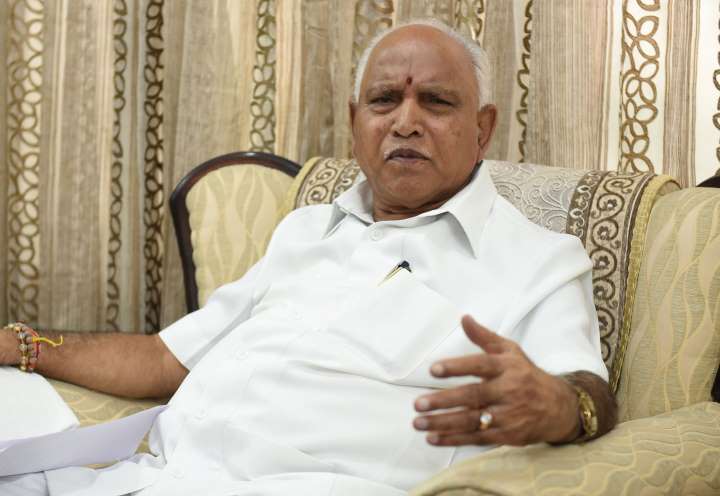
Yediyurappa's exit likely to destabilise BJP's base in Karnataka
If and when Yediyurappa walks out of chief ministership, there is a distinct possibility of a power struggle between the Lingayat mathas and the RSS.

The BJP’s moves to dislodge Karnataka Chief Minister B S Yediyurappa from office may amount to a self-goal for the party’s stability in the state. Already, voices of dissension have emerged from the powerful Lingayat support base over his imminent exit.
A couple of days since the 78-year-old Yediyurappa met BJP supremo and Prime Minister Narendra Modi where he reportedly offered to step down if the leadership desired, the development appears to have unsettled his supporters, particularly the powerful Lingayat mathas.
Yediyurappa is expected to formally announce his decision to leave on July 26, two years to the day when he started his latest stint as chief minister.
Also read: Is it the end of the road for Yediyurappa as chief minister?
The Veerashaiva-Lingayat community, which makes an estimated 17 per cent of the state’s population and is powerful in North Karnataka, is considered the backbone of Yediyurappa’s support.
Through his tenure, starting from the time when he became chief minister for the first time in 2008, Yediyurappa has cultivated the mathas assiduously and openly. In an unprecedented move, his first Budget officially allocated funds for the mathas and since then there has been no looking back for Yediyurappa.
Interestingly, the mathas in Karnataka are so powerful that some commentators like historian Janaki Nair even describe them collectively as an “unauthorised government” —meaning their clout in the state is pretty deep to the extent where they can even influence policy decisions.
Also read: As COVID rages, BJP rebels busy working to dislodge Yediyurappa
No surprise then that the chief minister made it a point to meet chiefs of 20 mathas on Tuesday with a view to explaining his possible decision to step down and convince them to continue extending support for the BJP, even after his exit.
Yediyurappa was quoted by the Deccan Herald as telling the pontiffs that he would have to accept the BJP High Command’s decision and leave.
Clearly, the Lingayat pontiffs are not buying Yediyurappa’s explanation. Balehosur Dingaleshwar Swamy, who briefed the media on the meeting with the chief minister, said they would organise a meeting of 500 seers and take a decision on the chief minister’s imminent exit.
Before the meeting, reports quoting Shivamurthy Murugha Sharana said Yediyurappa should not be replaced and there was no justification for the move.
If and when Yediyurappa walks out of his position, there is a distinct possibility of a power struggle between the Lingayat mathas and the RSS. Though both share common interests as far as the Hindu community is concerned, the Lingayats in Karnataka enjoy far more clout than the RSS.
Also read: Breaking into Karnataka’s power circuits, ‘mathadishas’ wield de facto authority
Yediyurappa’s successor is a matter of speculation, but given the past record of the BJP top brass in choosing chief ministers in Haryana and Uttar Pradesh, it is most likely that the next chief minister will have a close association either with the RSS or someone like Yogi Adityanath, a hardcore proponent of Hindutva.
Though the Lingayat mathas are part of the larger Hindu community, their involvement in education, charity and other social work has generally cut across all communities, including minority Muslims and Christians. From this point of view, over time, their presence has been uncontroversial and widely acceptable.
However, the RSS and other rabid followers of Hindutva have had a track record of “othering” those belonging to minority communities. This is likely to cause schism and break an informal secularism that exists in most parts of Karnataka.
In the rise of the RSS in the coastal region of Dakshina Kannada and the concomitant increase in Muslim and Hindu fundamentalism, there is an example of what happens when traditional syncretic practices among people are broken down.
For the Lingayat mathas, which have had a free run so far, the departure of Yediyurappa, therefore, may mean more than just the exit of a leader who did their bidding.
The BJP, almost since the time Yediyurappa assumed office in July 2019 after managing to break the then ruling Congress-Janata Dal (S) coalition, has not entirely been comfortable with his chief ministership.
Also read: Under Modi, Hindutva has gained primacy of place over development
Though Yediyurappa came from the ranks of the RSS, that alone has not been enough for him to sail through. For one, Yediyurappa insisted on giving ministries to most of those who defected from the Congress-JD(S) coalition at the expense of aspirants from the BJP.
Second, his Hindutva credentials seemed to have been blunted with some of his statements bordering on cordiality with the minority Muslims — something unthinkable for some of his colleagues who are considered rabidly anti-minority.
The final straw was the fact that Yediyurappa is ageing and increasingly represented informally by his younger son B Y Vijayendra in dealing with party legislators. Senior colleagues resented having to take orders from the chief minister’s son.
But, the central leadership comprising Modi and his aide, Home Minister Amit Shah, were unable to take a quicker decision as Yediyurappa is no lightweight in the state. Despite pushing him into a corner with critical statements about his functioning from his own colleagues including people like K S Eshwarappa and Basavaraj Yatnal, the chief minister did not budge.
However, over time, the BJP top brass appears to have worn down his opposition and has reportedly struck a deal. The elevation of party MP and close aide Shobha Karandlaje may have been part of the deal. Other elements of the deal could include a position of prominence for his younger son Vijayendra in the BJP. The elder son B Y Raghavendra is an MP and it is not clear if he stands to get anything more than that.

